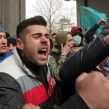
Russian Occupation Crackdown Against Crimean Tatars Intensifies
Publication: Eurasia Daily Monitor Volume: 12 Issue: 44
By:

Now that Vladimir Putin has admitted that he seized Crimea by force rather than annexed it to Russia following the free expression of the will of its population (Euromaidan Press, March 10), it is possible that more people will focus not only on that violation of international law but also on the way in which the Russian occupation authorities are behaving both generally and toward the Crimean Tatars. The indigenous population of Crimea, the Crimean Tatars have been the most consistent opponents of Moscow’s annexation of that Ukrainian peninsula.
These attacks on the Crimean Tatars are taking several forms: continued attacks on any leader or organization that speaks out in defense of the Crimean Tatar nation, the creation of alternative pocket Crimean Tatar organizations that Moscow can suggest speak for that nation, as well as illegal actions by officials and their allies among the ethnic-Russian community against individual Crimean Tatars in an effort to intimidate and spread terror throughout that group. And what is especially worrisome—because it may further suppress the outward flow of information about the current situation—is pressure on Crimean Tatar media outlets and, most recently, on human rights groups there.
The attacks on the leaders of the Crimean Tatars have continued, even though Mustafa Cemilev, the longtime leader of the nation, and Refat Chubarov, his successor as head of the Mejlis (the Crimean Tatars’ representative body), have been banned by the Russian authorities for five years and have had to work with their community via Skype and emails. On Sunday (March 8), Remzi Ilyasov, the deputy speaker of the pro-Moscow Crimean State Council and one of the few Crimean Tatars actively cooperating with the authorities, attacked both men, accusing them of “authoritarian” behavior and saying that they no longer had any right to be leaders of the community (Krymr.com, March 8).
These attacks are part of a concerted campaign to discredit the Mejlis, which has led the Crimean Tatars even before they were able to return to their homeland from their exile in Central Asia. In addition, the campaign seeks to discredit the Qurultay (Crimean Tatar National Congress), which chooses the Mejlis. Masked Russian officials have raided the Mejlis headquarters, and rarely a week goes by without one or another of its members being abused in the media or physically. All this is intended to lay the groundwork either for a wholesale reconstitution of the membership and leadership of these two national institutions or for their replacement by an alternative and pro-Moscow institution like Kyyrem which already insists that it is the only body with the right to speak for the Crimean Tatars. That Moscow has had to proceed relatively slowly on this front reflects both the continuing support Cemilev and Chubarov have, not only among Crimean Tatars but internationally, as well as the opposition of ordinary Crimean Tatars to this Russian sleight of hand.
Over the past year, Russian authorities have made numerous promises to the Crimean Tatar community but have not lived up to any of them either because they lack the funding to do so or because they may have concluded that any spending in that direction would be throwing good money after bad. Thus, not having many carrots to encourage ordinary Crimean Tatars to change their mind about the occupation of Crimea, the occupiers have decided to try sticks instead. They have raided the homes and businesses of Crimean Tatars, they have challenged Crimean Tatar property rights in some areas, and they have “disappeared” and likely killed a mounting list of Crimean Tatars (see EDM, March 21, 2014; April 28, 2014; May 9, 2014; September 23, 2014).
This repression is having two consequences, both of which the occupation authorities are trying to exploit. On the one hand, Russian policies have so infuriated the Crimean Tatars that some of them are now listening to Islamist radicals, allowing Moscow to claim that they are becoming an advance guard for the Islamic State or the Taliban—thus providing yet another argument for those who oppose challenging Russia’s illegal occupation of Ukrainian territory. And on the other, because Crimean Tatars are likely more upset with Moscow now than they were a year ago, immediately after the peninsula’s annexation, both the Russian occupation authorities and the Russian central government see ever less reason to provide the Crimean Tatars with the help they promised. Such half-hearted support by Moscow will not make Crimean Tatars any more pro-Russian, but it will allow the Russian government to claim that it tried and that any remaining problems are, in fact, the fault of the Crimean Tatars themselves (Ukraina.ru, March 2).
But the most ominous thing the Russian occupation forces are doing is to try to intimidate or close down media outlets and rights groups that have been reporting on these developments. QHA, the largest Crimean Tatar news agency, has been denied a second application for official registration and may be forced to close down soon (Khpg.org, February 23). And now, the occupation authorities are seeking to intimidate members of the Committee for the Defense of the Human Rights of the Crimean Tatar People into keeping quiet or face even more serious treatment (Qha.com.ua, March 5).
Moscow seems to believe that if Russian officials mistreat Crimean Tatars and no one finds out about it then it has not happened. It is up to all those who care about the fate of that nation, human rights more generally, and international law to make sure that the Kremlin’s belief turns out to be misplaced.




